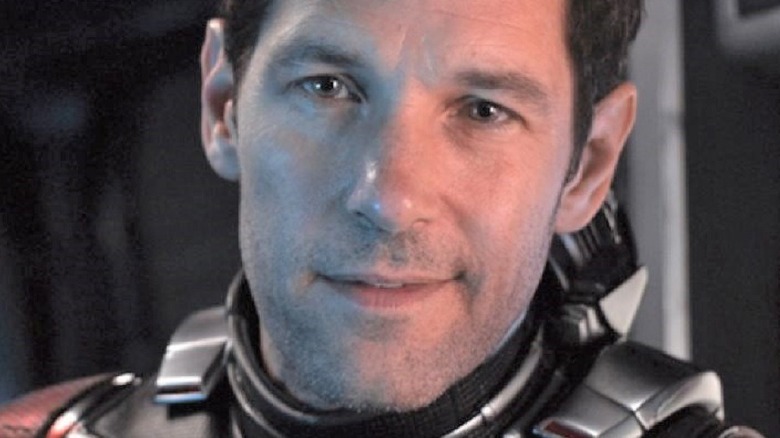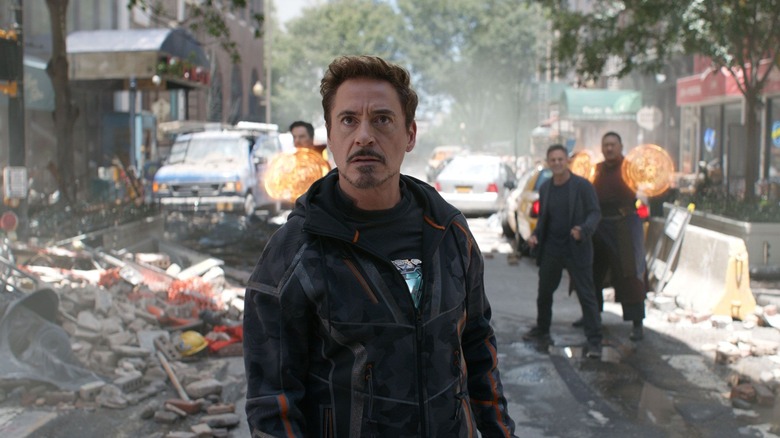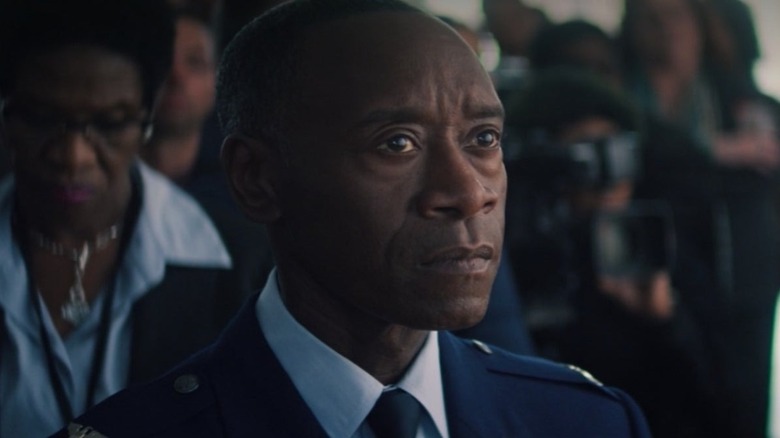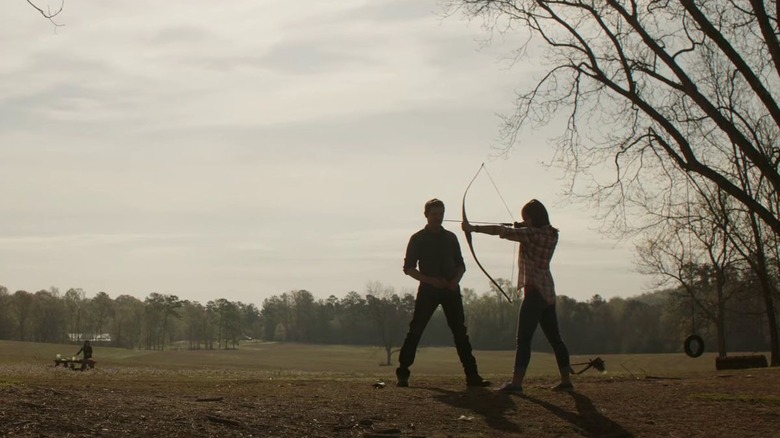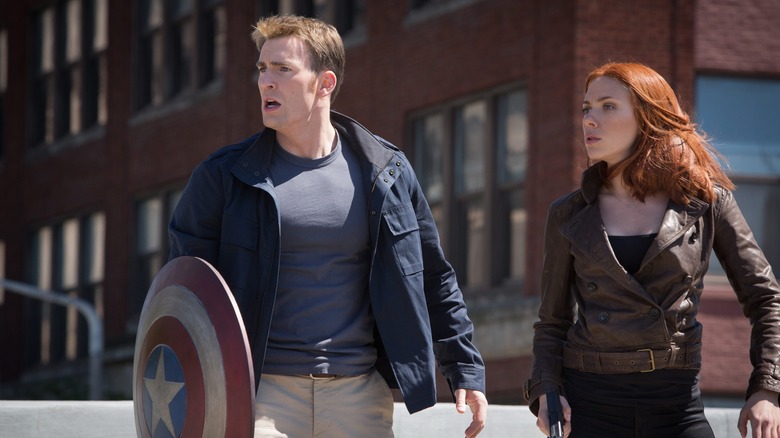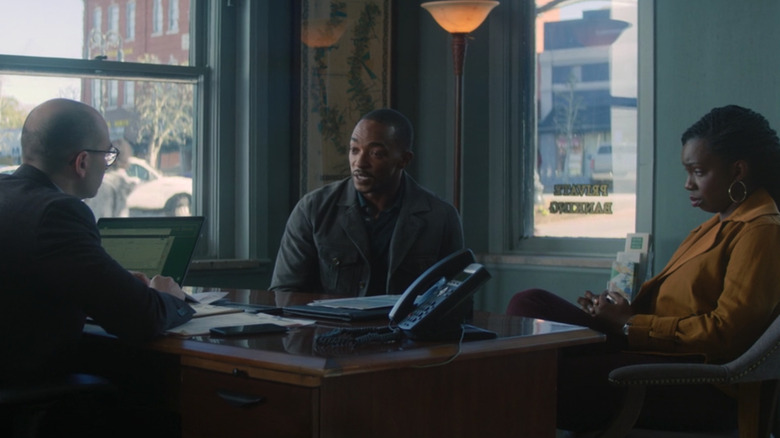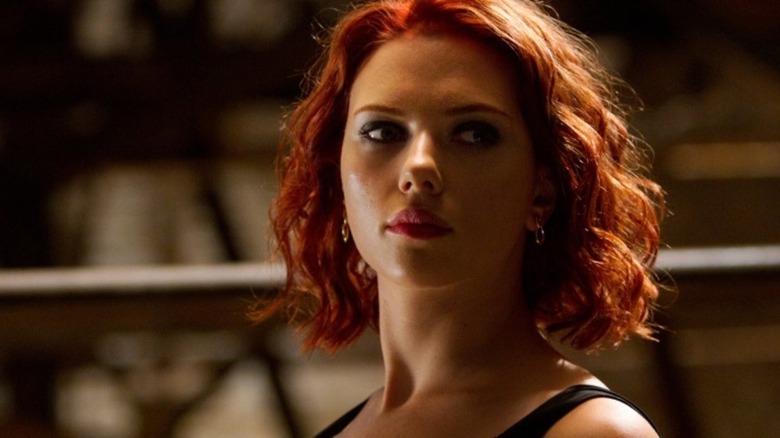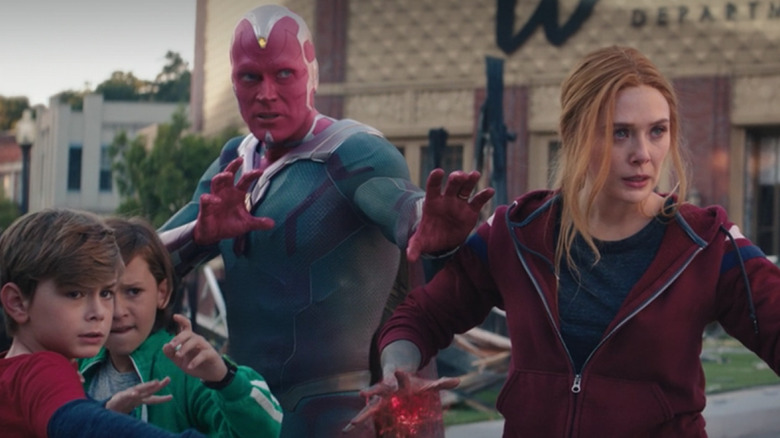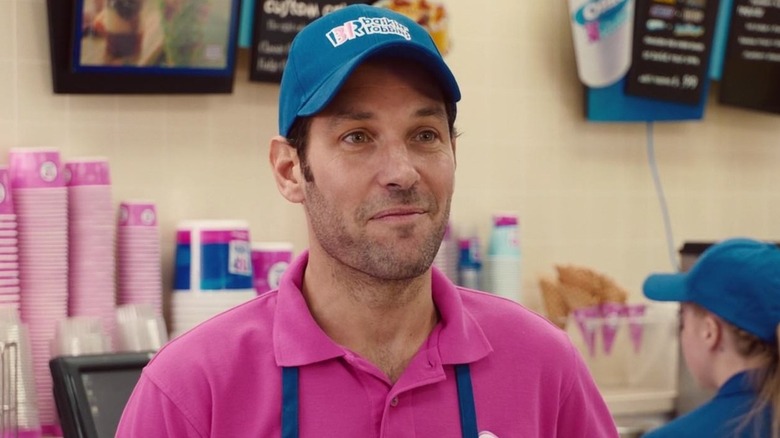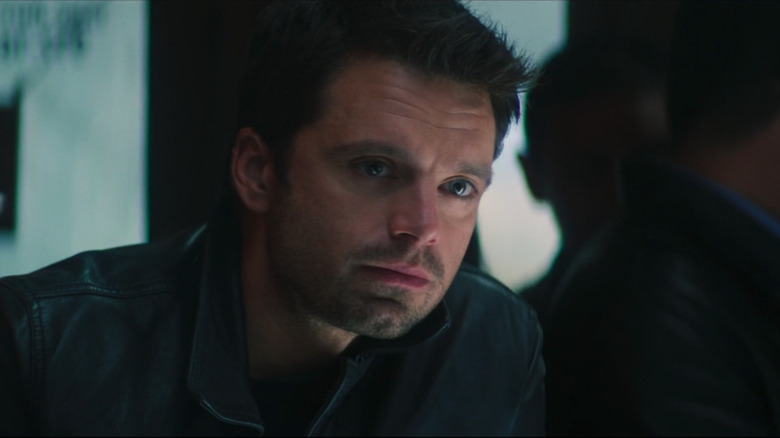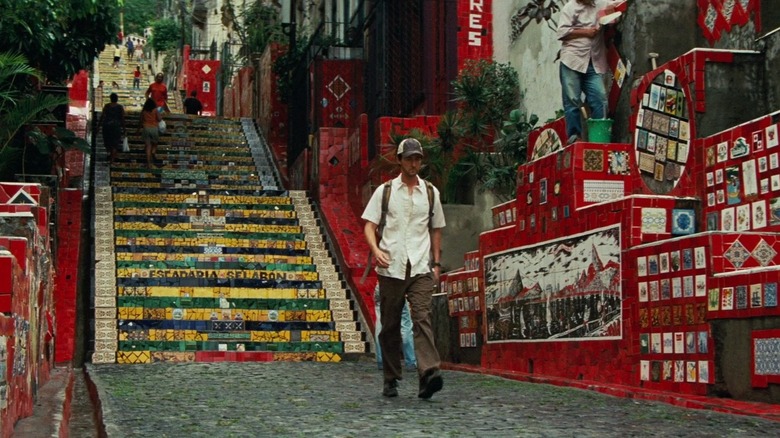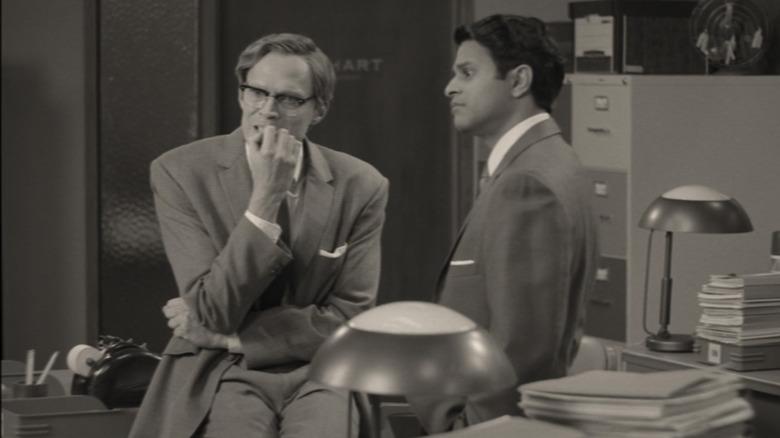How Do Superheroes In The MCU Make Money?
"The Falcon and the Winter Soldier" revealed a lot of juicy new tidbits about the MCU. We learned that Zemo really was a baron — and a rich one, at that. Isaiah Bradley's unsavory treatment at the hands of the U.S. government was also pretty big news. And, of course, fleshing out Bucky's history even further provided a richer backstory for a character we hope isn't going anywhere any time soon.
One of the biggest revelations throughout the entire show, though, came right out of the gate. In the first episode, Sam Wilson and his sister head to the local bank to take out a loan to salvage their failing family business. In the process, we find out that the siblings can't get approved, even with Wilson's superhero clout backing things up. This exposes the fact that Wilson doesn't just lack the personal funds to help prop up a small family business. He can't even borrow the cash to do so.
The revelation opened up a can of worms amongst Reddit feeds, social media groups, and every other place where MCU zombies gather to discuss their favorite Marvel media. The question in the spotlight? How do superheroes in the MCU make their moolah? There's very little to definitively work off of, but that's never stopped Marvel fans from speculating, and we decided to jump into the fray with our own thoughts and opinions on the subject.
It has to start with Stark
It doesn't matter if it's stated plainly or not. The first three phases of the MCU must have been primarily funded by billionaire philanthropist and savior of the universe Tony Stark. The Starkster had near-infinite money to work with, endless resources, plenty of empty facilities, and a vision of bringing the best heroes together to stop extraterrestrial threats. This combination of factors heavily implies that Stark opened his bank accounts to his superhero friends early and often.
But while there's no doubt that Stark's cash kept a huge chunk of the Avengers up and running, for many, it wasn't their only source of income. On the contrary, chances are slim that Stark set up payroll and direct deposit to keep his team financially afloat. Instead, from what we see, he appeared to be all about funding the Avengers facility, keeping it well-stocked (even when he found coffee grounds in the garbage disposal), and generally ensuring that those living "on campus" had what they needed.
But once the hero passes in "Avengers: Endgame" and the team's HQ goes kablooey, it appears that the group isn't able to maintain their cushy, bought-and-paid-for lifestyle. We already know that Falcon is scrounging for cash hundreds of miles away six months after the Battle of Earth, but who else was impacted by the change? Let's go through a handful of the most prominent heroes in the MCU and speculate a bit on where they generated an income before, after, and during the Blip.
War Machine
James Rupert Rhodes has been in the MCU since day one. Throughout his tenure in the franchise, Rhodey has remained tied at the hip to his bestie, Tony Stark. This means, of course, that his financial situation has always paled in comparison to his wealthy friend, but that doesn't mean the Iron Patriot has any trouble paying the bills.
On the contrary, while he may be closely intertwined with Tony Stark's story, Rhodes consistently shares his loyalty with the U.S. government. The patriotic character is a high-ranking member of the United States Air Force — a role that serves as the initial catalyst for him spending so much time with Stark, as Rhodey serves as the official liaison to Stark Industries.
Rhodes begins as a colonel, and the highly distinguished officer only continues to rise from there. Naturally, it can be assumed that his pay grade also balloons with his experience and titles. Add onto that the fact that any time he was with Stark, the billionaire probably picked up the tab, and Rhodey is in one of the better financial situations, all things considered.
Clint Barton
Hawkeye's MCU trajectory is quite different from his comic book career arc. That said, it's also a bit more stable and even includes a private home. In "Avengers: Age of Ultron," we also find out that this hideaway wasn't even purchased by Barton himself. His family home was bought and paid for by Nick Fury when Barton joined SHIELD. The director created the safe space for Barton's family back when he joined the organization.
And, of course, the home is just the outward manifestation of a much larger source of income. Barton works for SHIELD for years. In fact, by the time the Avengers are formed, he already has an established history with Natasha Romanoff, and the two have been serving as SHIELD agents for a while. Of course, the whole department goes kaput in "Captain America: The Winter Soldier," but chances are by that time, Barton has a pretty good nest egg saved up from a life spent doing top-level spy work and moonlighting as an Avenger.
And knowing the low levels to which he stoops during the Blip, there's a good chance that, unsavory or not, this guy's got the brains and the brawn, not to mention the resume, to pick up some spy-focused side gigs if he ever runs low on cash. While Barton's future may be in flux, we're willing to bet that the hero's bank account is doing just fine.
Steve Rogers
Captain Rogers is a financial conundrum. Like Rhodey, he probably receives a military paycheck in his first film, and he may have even had some kind of pension set up once he comes out of the ice. He's also most likely getting paid by SHIELD in his second titular outing, but again, he kills that golden goose by literally upending his employer's entire organization. Fast forward to "Captian America: Civil War," and the dude parts ways with Stark — who's presumably his primary source of livelihood at that point — and heads off into hiding.
This is where it gets difficult to peg how he makes ends meet. With all of his income bridges burned, Nomad Cap and his team manage to set up a life spent evading authorities. If one had to guess, they probably were able to pawn some of their fancy superhero gadgets and may have even been able to pick up work as heroes-for-hire. There's also his ties to Wakanda to keep in mind.
After "Infinity War," Cap appears to have resumed his life at Avengers HQ. From there, he seamlessly jumps back in time and marries Peggy Carter, who has a lofty government job and probably isn't hurting for cash. Cap may be one of the best superheroes to ever don the spandex, but when it comes to money, all signs point to his living off of the generosity of others while he goes around putting out fires and jumping on grenades.
Sam Wilson
Alright, let's tackle the one that even Marvel Studios opted not to clarify. After all, they clearly point out that Sam Wilson is short on cash in his first Disney+ outing, but they fail to explain why that's the case. But before we get too far, let's fill in some guesswork regarding how the new Cap paid his bills in the past.
We already know that Wilson probably starts with a steady, government-backed paycheck. Back from active duty, the hero-in-waiting is counseling veterans struggling with PTSD when he meets Steve Rogers. From there, he gets sucked into Rogers' world, where he probably finds himself also living on Stark's dime before he opts for a life on the lam. Unlike his partner, Falcon spends the Blip snapped away and is forced to pick up the broken pieces of his life when he returns five years later.
From there, he finds contract work with his old employer, the U.S. Airforce. Of course, contracting tends to be inconsistent. Add onto that his five-year disconnect with the Avengers, the destruction of the compound, and the fact that Stark and Rogers are no longer around, and it becomes easier to see why he couldn't come up with some cash for his family business.
Still, we have to ask: Stark really couldn't set up some kind of an Avengers trust fund or something to keep the group's expenses covered and their minds focused on defending the Earth? After all, he made sure to help Peter Parker after his death, so he clearly gave the idea some thought.
Natasha Romanoff
Black Widow met her fate in "Avengers: Endgame," but up until that point, she had no problem taking care of her financial obligations. Much like Barton, the hero seems to have done this via a few different government channels. She worked as a spy for SHIELD before she partnered up with the (probably) all-expenses-paid, Stark-run Avengers. Unlike Barton, she also spent time before this working as a Russian spy. Regardless of whether it's Russia, the U.S., or Stark, Romanoff generally found herself in positions where her basic needs could be pretty easily met.
Then, of course, she went off into hiding with Cap. This could've posed a fiscal threat, but with such a deep past and so many connections, we're willing to bet that finances weren't a major issue even then. Whether it was through savings or tapping into some established financial pipelines, Nat probably didn't have much of a problem coming up with cash even when she was in hiding. After "Infinity War," she seems to have settled down at the Avengers HQ, where she lived out the rest of her days before "Endgame." While it may have come from a few different places, Black Widow's funding comes across as a minor issue to a character whose resourcefulness was always impressively apparent.
Wanda Maximoff
Most of the characters in the MCU tend to pivot from established jobs — a lot of which seem to be in the government — into superhero roles. Not Wanda, though. She's born a poor commoner in Sokovia, where she's orphaned at 10 years old. From there, she spends time in an orphanage until she reaches adulthood. As a grown-up, Wanda gets involved in protests and riots before officially joining HYDRA as a willing volunteer to be experimented on.
Throughout this entire portion of her life, Wanda's income is in the control of others. Her parents, the orphanage, and Baron von Strucker certainly foot the bill. Even once she escapes this cycle of horror, Wanda ends up living in Stark-funded Avengers facilities. But after "Civil War," exiled Wanda probably has to scrounge for cash along with the rest of the nomadic heroes. From there, she's snapped away for five years and then takes over Westview not long afterward. All that to say, Wanda hasn't needed to do much in the way of funding throughout her life so far.
Nevertheless, the question has to be asked: Is Wanda able to conjure sustenance for herself when she's in her alternate reality? Can she do the same with cash? How does she pay for her little country cottage in Sokovia at the end of "WandaVision?" Did she have to rob a bank? Did she have money stowed away somewhere? Is it a family estate? Honestly, we don't know how that one works out on the balance sheet.
Scott Lang
Scott Lang's financial escapades throughout the MCU are well-known. Of particular note is his hack of the VistaCorp system where the Robin Hood-esque scoundrel returns a bunch of money to the greedy organization's customers. While awesome, it's hard to ignore the fact that this doesn't leave Lang with any money to cover his own expenses. In fact, quite the opposite. The adventure ends with the man in jail without a penny to his name.
This launches Lang into one of the most depressing financial adventures of the entire MCU to date. Upon being released from prison, the hero-to-be picks up a job slinging ice cream (and only ice cream) at a Baskin Robbins. After losing that position, he eventually slips back into a life of crime — which doesn't pay off financially, by the way, even though it does lead to his superhero career.
Over time, Lang teams up with his fellow ex-cons to create X-Con Security Consultants. The shift into small business ownership seems like a good one, but we see the company struggles to get started. This begs the question of how Lang is able to continue to bring in an income, particularly while he's under house arrest. Maybe he spends time freelance writing or picking up random gigs online. No question that the financial gap is a quandary, though. Once the business is up and running, it gets easier to excuse away any expenses as covered by his growing corporation, of course. Here's to a bright, secure future, guys.
Bucky Barnes
Bucky Barnes has a pretty rough ride through most of the MCU. That said, as far as finances go, his money problems likely don't start until later on. Barnes begins his MCU life in the Army, cashing in on those good ol' military paychecks. When he's captured by HYDRA and turned into the Winter Soldier, the one thing that Bucky doesn't have to worry about any longer is the cost of living. Whether he's being nourished and clothed by his captors or spending long chunks of time in cryostasis, Bucky never has to think about paying the bills.
However, once he's freed from the clutches of HYDRA by his forgotten friend, Steve Rogers, Bucky finds himself needing to pay for things like a dwelling, food, and clothing. Based on the state of his apartment in "Civil War," he doesn't seem to be doing that very well at first. That said, it isn't made clear whether he pays for these things with hard-earned money or if he raids some old HYDRA bank accounts or some other clever tactic to bring home the bacon.
Not long after this, Barnes finds himself in Wakanda, where — along with healing from his Winter Soldier programming — he's well-fed and housed. From there, he spends five years snapped away, and then we see him living simply yet comfortably in "The Falcon and the Winter Soldier." But whether that's due to a job, stolen HYDRA funds, or decades of back pay from the Army remains to be seen.
Bruce Banner
Bruce Banner and the Other Guy have an interesting path through the MCU. After a single solo outing that establishes some solid info, they've gone on to operate as a sort of support staff, only making appearances here and there in other franchises. This makes it harder to track the pair's financial history after the first film. But we're here to guess, project, and puzzle those various pieces into something that potentially makes sense, right? So here we go.
Banner was a prominent scientist before he became the Hulk. So we'll start with the baseline that he could've had a solid stash of cash already saved up before things went south. From there, we see him doing factory work in "The Incredible Hulk," implying that he's also bringing in income whenever he can.
After his solo film, Banner goes back into hiding and probably picks up some more mundane, out-of-the-way gigs. (We know he spends some time in India, helping out the sick, although we doubt he was charging much for that, if at all.) But once he connects with the Avengers, Stark takes a particular liking to the hulking hero, who probably gets most of his bills footed by his new philanthropist friend — at least for a while.
After "Age of Ultron," though, Hulk heads to Sakaar, where he does very well for himself as a gladiator. After Sakaar, Banner spends time in a lab, creating Professor Hulk, who appears to stick around the Avengers HQ during the Blip years. Up until "Endgame," Hulk's finances make sense. But now that Stark and his home are gone, it will be interesting to see how he manages for cash.
Vision
Built by Ultron, programmed by Bruce Banner and Tony Stark, and brought to life by Thor and an Infinity Stone, Vision is anything but a typical superhero. That said, he probably doesn't need much in the way of money. It's ironic since Vision himself is probably one of the most valuable items on all of planet Earth.
Still, there are occasions when Vision could use some cash. Take, for instance, when he meets Wanda in Edinburgh. The couple is staying in what appears to be a hotel or a bed and breakfast, and presumably, there's a bill attached to the rendezvous. Vision's ethics are already challenged by his abandoning the Avengers for the hook-up, which means he probably didn't also steal from Tony Stark to pay for the adventure. Perhaps he leans on the generosity of his exiled girlfriend on that particular occasion.
But apart from one-off events, Vision pretty consistently doesn't need money. He clarifies in "WandaVision" that he doesn't need to eat — especially gum. He's also made of vibranium and doesn't need shelter or clothing. While he gets dressed, occupies living spaces, and eats meals for the sake of blending in, at the end of the day, Vision is the one super that genuinely doesn't need money to pay for his superhero lifestyle.
